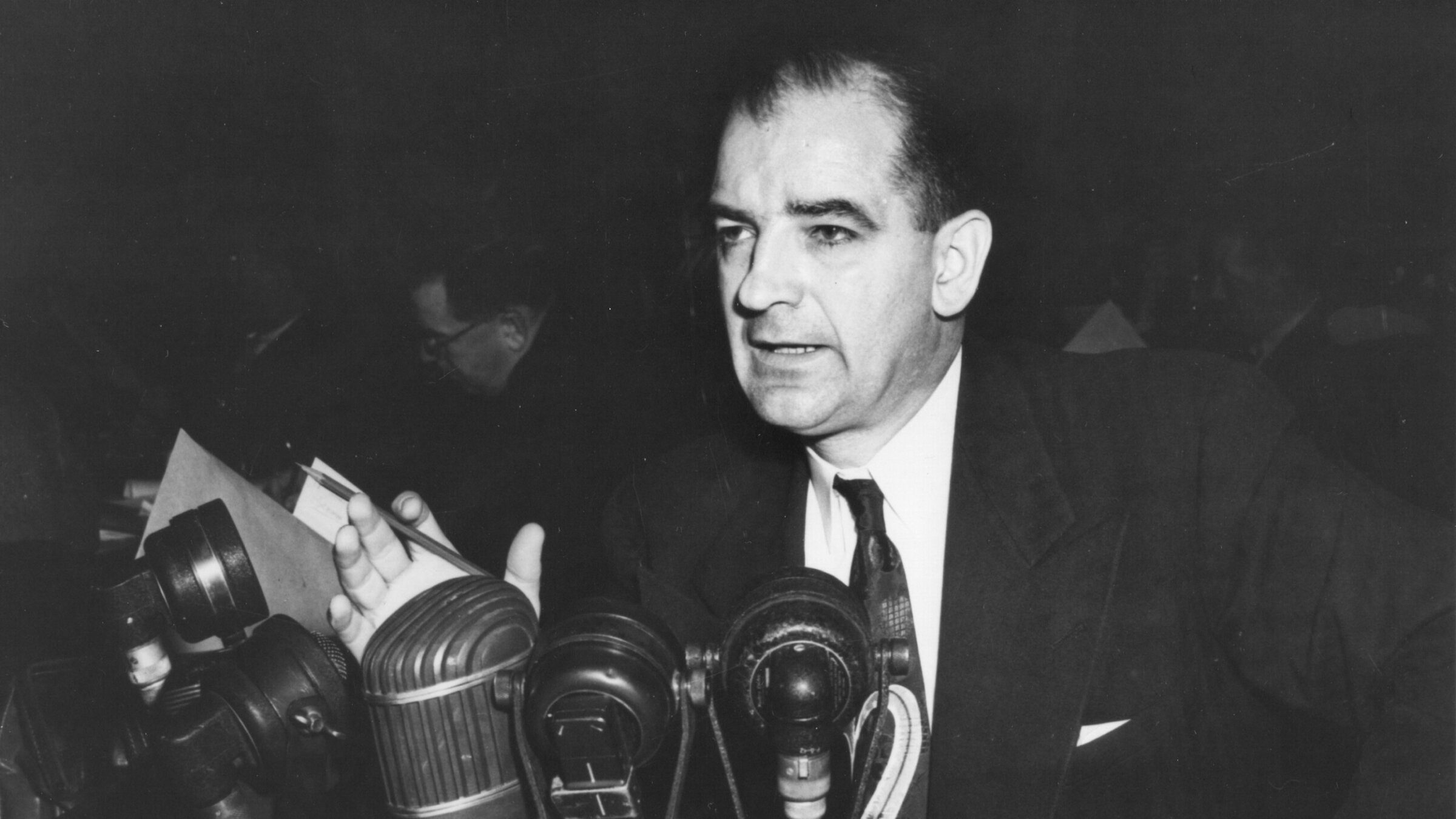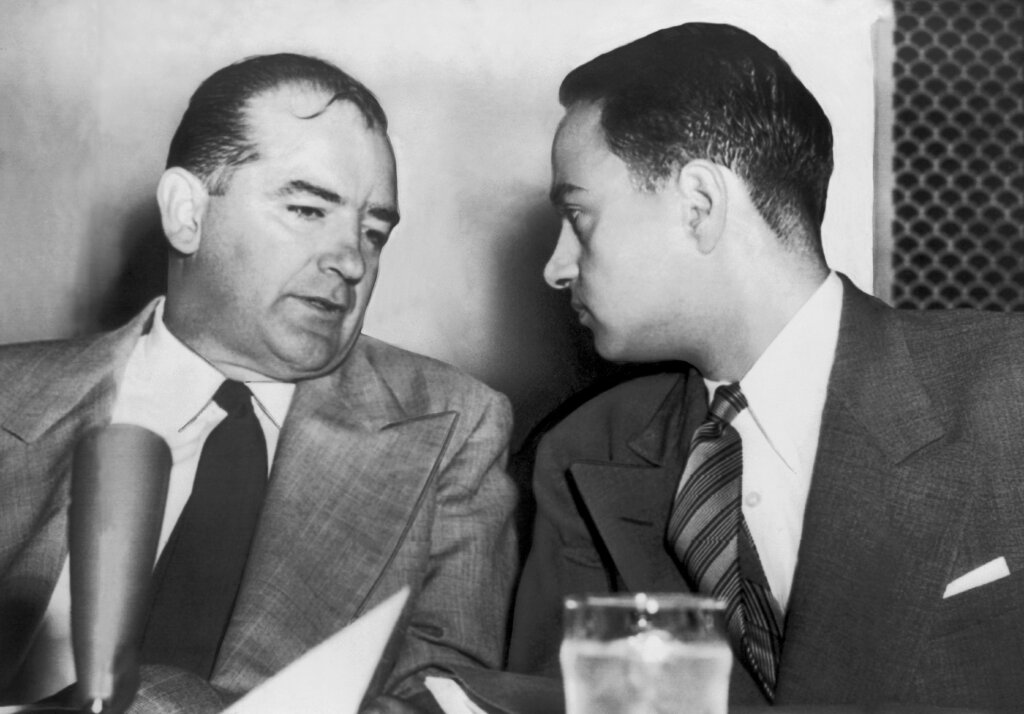Don’t compare Trump’s US to Nazi Germany. These 3 American moments are more apt.
There is a straight line from Sen. Joseph McCarthy to President Donald Trump

Senator Joseph R. McCarthy. Photo by Photoquest/Getty Images
Too often these days, my friends reach for the easy analogy when talking about the political changes unfolding in the United States. “This is just like Nazi Germany!” they say.
I understand the fear that undergirds that response. But, no, this is not Germany. “History doesn’t repeat itself,” goes a popular adage, “but it rhymes.” And today’s moment has three resonant, frightening rhymes, right here at home.
The first: the Palmer raids, named for then-Attorney General A. Mitchell Palmer, which began on the night of Nov. 12, 1919. After Italian anarchists sent bombs to elected officials, a young J. Edgar Hoover launched raids in 11 cities targeting Italian and eastern European Jewish immigrants with alleged leftist sympathies. Agents arrested 6,000 people. Then, as now, the criminal actions of a small minority of immigrants prompted a generalized xenophobia.
This first Red Scare paved the way for successive waves of hate and suspicion, leading to the second historical rhyme: the 1930s, when growing fascism and authoritarianism abroad found powerful adherents here. Among them were:
- Charles Lindbergh, the aviator who soared to popularity with his radical isolationism, “America First” ideology, affection for the Nazi regime, and antisemitism.
- Huey Long, the governor of Louisiana, whose eclectic political philosophy combined elements of populism and a demagoguery that flirted with European-style fascism.
- The pro-fascist, antisemitic Catholic priest Father Charles Edward Coughlin, whose hateful radio broadcasts reached 30 million listeners before he was driven from the airways in 1939.
- Nazi sympathist organizations, such as the German American Bund, which was isolationist, anti-Communist, and antisemitic, with presences in many American cities.
But by far the most apt and applicable rhyme is the environment of paranoia, accusation and terror of the McCarthy period.

In the early 1950s, Senator Joseph McCarthy of Wisconsin rose to power by creating a campaign of fear. McCarthy destroyed countless lives while going after the Army, Hollywood, and ordinary American citizens who had been Communists, Communist sympathizers, Communist dabblers, or even just socially liberal. He was one of the most destructive forces in American history, and many families in this country still bear the scars of that era.
Larry Tye’s wonderful, disturbing biography of McCarthy — Demagogue: The Life and Long Shadow of Senator Joe McCarthy — opened my eyes to the parallels between the world view and tactics of the Wisconsin senator and the current occupant of the White House.
The first similarity is demagoguery.
“The dictionary definitions of demagogue and McCarthyism are strikingly similar,” wrote Tye. “Both involve gaining power by playing to emotions and passions, then fanning those prejudices by flinging accusations. Both tap overblown oratory, simplified logic, and outright untruths to plant discord and seize power.”
The second similarity is an approach in which the facts are “deliberately distorted and told with a shaking fist; remaining a step ahead of fact-checkers while never recanting anything.”
McCarthy knew how to seize on the public’s fears. Trump has the same talent. McCarthy went ballistic on elites; so does Trump. McCarthy found ready scapegoats for America’s troubles: communists. For Trump, it is immigrants.
And the two are connected through the notorious Red-baiting lawyer, Roy Cohn. Cohn was a young Donald Trump’s concierge, mentoring Trump until Trump dropped him. His relationship with Trump is the subject of the Academy Award-nominated film The Apprentice. Even better: the documentary Where’s My Roy Cohn?
But, who originally mentored Roy Cohn? Joe McCarthy.
There is a straight line from McCarthy to Cohn to Trump. Trump learned from the worst.
We can see evidence of that connection in the damage that McCarthy did, and the damage that Trump is already doing.
McCarthy’s reign of terror lasted for only five years. That period left an indelible scar on the American soul. Whenever there are limits on free speech and the free flow of ideas, we invoke his name: “McCarthyism.”
The McCarthy trauma did not go away. We are partially reliving it now.
So, yes, there is a dark precedent for these times; it’s just not Hitler, but more homegrown.
So, what gives me hope?
First, McCarthy ran out of steam. Whatever we are experiencing now will end. As for what the lasting damage might be: We cannot yet know.
But, the second thing that gives me hope is one of the greatest quotes in American history.
Joseph N. Welch served as the Army’s chief counsel while it was under investigation for Communist activities at what are now called the Army-McCarthy hearings. In spring 1954, during those hearings, Welch turned to McCarthy and asked him: “Have you no sense of decency, sir, at long last?” By then, he was merely echoing what much of the nation was thinking.
It might be that more people remember what Welch said — in one plaintive question — than anything that McCarthy said.
Let Welch’s question be the question that we ask — as often as necessary.
Consider how CBS correspondent Eric Sevareid “eulogized” the Wisconsin senator: “If history finds that McCarthy used his strength in a wrongful manner,” he said, “it will find that the weakness of others was part of the fault.”
Correction: An earlier version of this story erroneously attributed the quote, “History doesn’t repeat itself, but it rhymes”. It was most likely first coined by Theodor Reik, not Mark Twain.

















